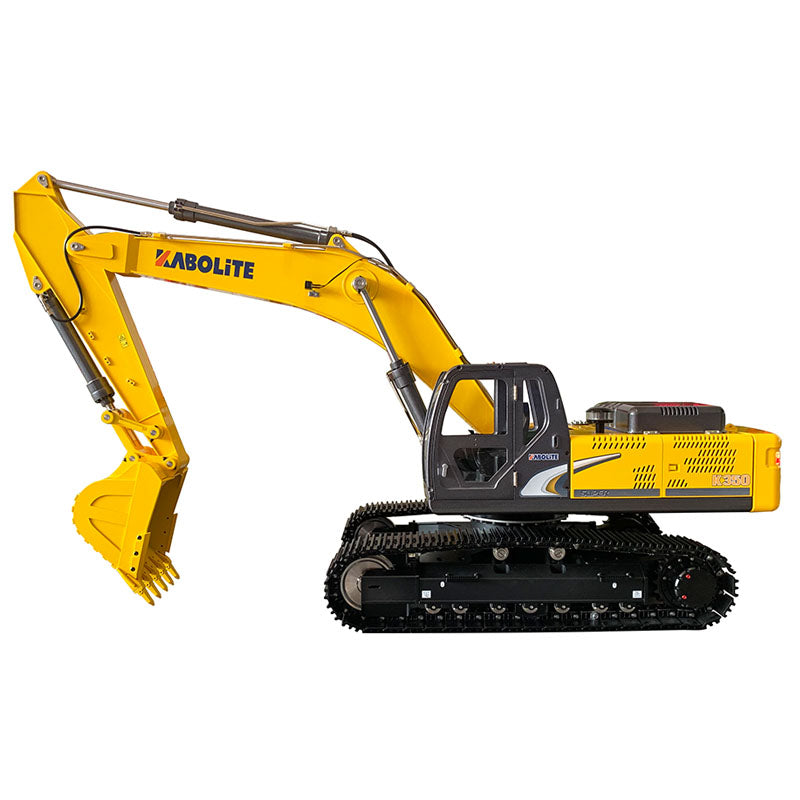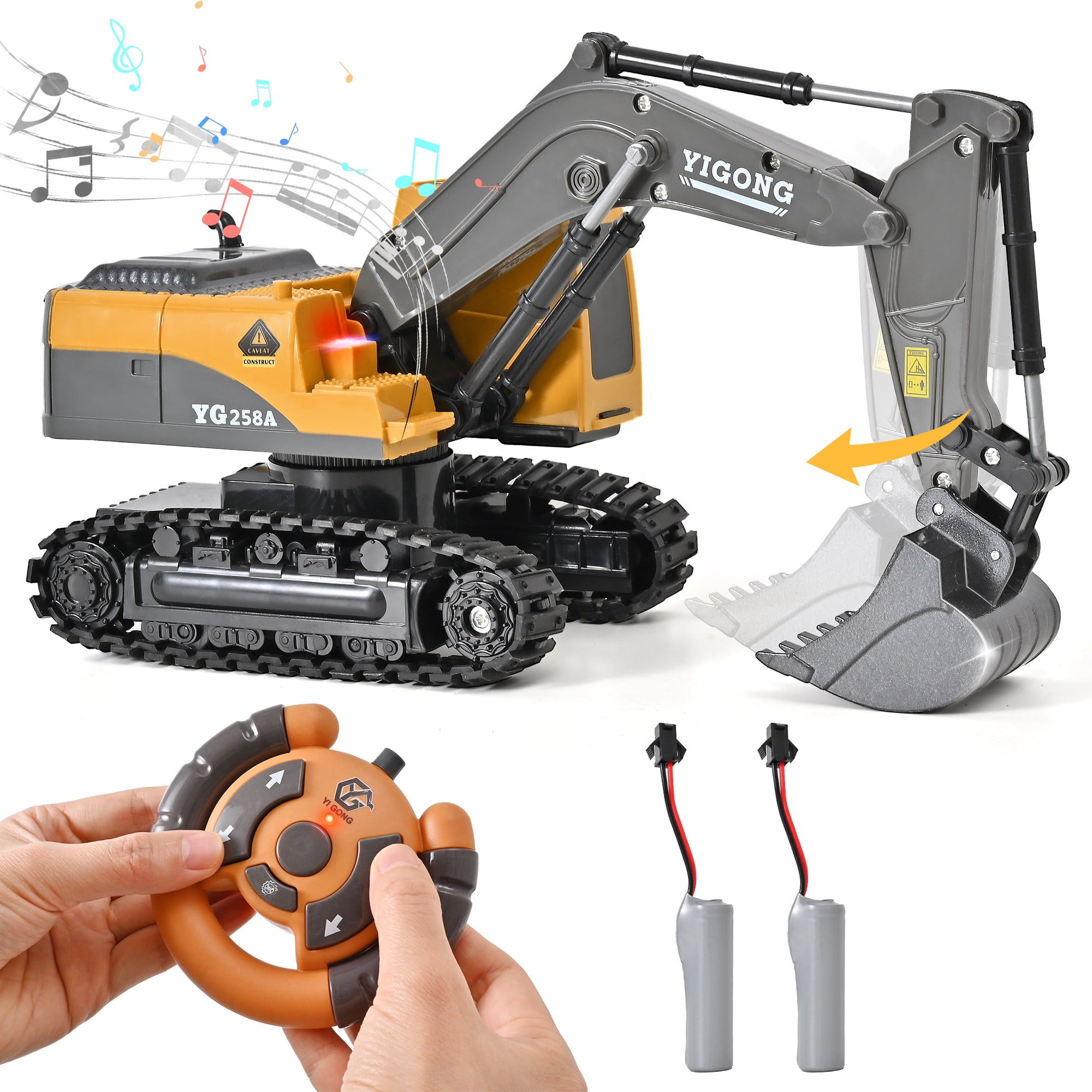Discover the Value of Excavator in Modern Building And Construction Projects
Excavators are essential devices in contemporary building jobs. Their versatility enables them to execute a variety of jobs, from digging and grading to demolition and website prep work. Advanced attributes, such as hydraulic attachments and general practitioners, enhance their capabilities and effectiveness on work sites. As the market progresses, the value of excavators grows also more. Recognizing their role can disclose insights right into the future of building and construction techniques. What exists ahead for these devices?
The Flexibility of Excavators in Different Projects
Excavators are frequently connected with massive building tasks, their flexibility enables them to be used in a large array of applications, from household landscaping to utility maintenance. In metropolitan settings, excavators can navigate tight areas to dig structures for homes or set up water drainage systems. Their capacity to execute fragile jobs makes them optimal for landscaping projects, where they can excavate for fish ponds or plant trees. On top of that, excavators play a vital duty in energy maintenance, successfully excavating trenches for pipelines or wires without interfering with bordering areas. In agricultural applications, they assist in land clearing up and dirt preparation. Their versatility enables them to be outfitted with different attachments, boosting their capability across different tasks. This complex nature of excavators not just simplifies numerous building processes yet additionally demonstrates their integral function in modern facilities development and maintenance.
Trick Functions and Kinds Of Excavators
The discussion on crucial features and kinds of excavators highlights the vital characteristics that make these machines invaluable in building and construction. Various excavator kinds, each created for particular tasks, demonstrate their adaptability and effectiveness throughout different applications. rc excavator. Comprehending these categories and features is crucial for optimizing their usage in modern-day construction jobs
Excavator Types Summary
Excavators play a pivotal role in modern-day construction, offering adaptability and performance across numerous tasks. These heavy machinery systems can be found in several types, each customized for specific applications. The most common types consist of spider excavators, recognized for their security on unequal surface, and rolled excavators, which give higher mobility on paved surfaces. Small excavators are favored for limited spaces and small-scale projects, while long-reach excavators are created for deep digging. Furthermore, there are specific excavators, such as hydraulic excavators, which improve power and accuracy. Each kind features unique abilities, making them essential for tasks ranging from excavating and grading to demolition and product handling. Recognizing these variations enables building and construction professionals to choose the ideal excavator for their task requires.
Trick Includes Explained
Understanding the key features of excavators boosts their reliable application in building and construction tasks. Excavators are defined by their powerful hydraulic systems, which supply the needed force for digging, lifting, and relocating materials. Their verbalized arms enable a large range of activity, promoting specific procedures in constrained areas. Furthermore, the range of accessories, such as pails, grapples, and augers, broadens their flexibility to meet various job demands. The size and weight of excavators additionally add to their security and ability to move on numerous surfaces. In addition, advancements in technology have resulted in the combination of GPS and automation, boosting accuracy and performance in excavation tasks. These features jointly position excavators as vital tools in modern building.
Applications in Construction
Transforming building websites, excavators play a pivotal function throughout various applications, ranging from domestic structure projects to large framework growths. These functional makers are geared up for jobs such as digging foundations, trenching for utilities, and website grading. Different kinds of excavators, consisting of crawler, wheeled, and mini excavators, offer details advantages tailored to the project needs. Crawler excavators master rough terrains, while wheeled excavators offer wheelchair on smooth surface areas. Tiny excavators are perfect for constrained rooms, making them popular in urban settings. The effectiveness and power of excavators substantially quicken building and construction processes, making sure timely job completion. Their versatility better boosts their importance, allowing construction groups to tackle a varied range of obstacles properly.
Enhancing Efficiency and Efficiency on Task Sites
Taking full advantage of performance and performance on task sites is a critical objective in modern-day construction. Excavators play a crucial duty in attaining this objective by simplifying different jobs. Their capacity to carry out multiple functions-- such as excavating, grading, and lifting-- reduces the need for extra equipment, thus saving time and resources.Moreover, excavators improve operations by permitting for faster completion of tasks. With sophisticated functions like hydraulic add-ons and GPS technology, they can execute exact operations that minimize mistakes and revamp. This accuracy not just boosts the quality of work yet also maximizes material usage, adding to cost savings.The adaptability of excavators allows them to adjust to various website conditions, guaranteeing that jobs progress smoothly no matter difficulties. By integrating excavators into construction procedures, groups can considerably increase their general productivity, bring about timely job completion and raised success.
Security Advantages of Using Excavators
Excavators considerably boost safety on building and construction websites through enhanced driver presence and decreased manual work risks. By supplying drivers with a clear view of their environments, excavators assist to avoid mishaps and injuries. In addition, the equipment decreases the demand for employees to participate in unsafe hand-operated jobs, further promoting a much safer workplace.
Enhanced Operator Presence
Building websites can be disorderly and loaded with possible hazards, enhanced operator exposure plays a vital role in guaranteeing safety when using excavators. Modern excavators are created with large, unobstructed home windows and purposefully put mirrors, permitting drivers to maintain a clear sight of their environments (rc excavator). This enhanced visibility is essential for detecting pedestrians, various other equipment, and numerous challenges, significantly lowering the danger of accidents. Additionally, several excavators include innovative modern technology, such as cams and sensing units, to give operators with additional point of views, additionally enhancing recognition. The capability to see even more plainly not only help in efficient procedure but additionally promotes a safer work setting, making it much easier for operators to browse intricate building websites without compromising security criteria
Decreased Manual Work Dangers
When hand-operated labor is decreased with the usage of excavators, many safety and security benefits arise, substantially enhancing the health of building and construction workers. Excavators lessen the physical stress connected with hefty lifting and repeated jobs, efficiently lowering the danger of musculoskeletal injuries. By automating procedures such as digging, grading, and relocating products, they permit workers to preserve a more secure range from potential threats. Furthermore, excavators are equipped with advanced safety attributes, such as rollover security systems and boosted driver functional designs, which even more safeguard workers on website. The outcome is a substantial decrease in office accidents and injuries, bring about increased efficiency and morale among construction teams. Inevitably, the fostering of excavators contributes to a much safer and a lot more effective building environment.
Excavators in Earthmoving and Site Preparation
In modern-day construction, a significant portion of earthmoving and site preparation tasks depends on the performance and flexibility of excavators. These makers are made to handle different dirt types and terrain, making them essential for grading, excavating, and trenching tasks. Their hydraulic arms can be geared up with different accessories, such as containers and augers, enabling operators to customize their additional hints strategy based upon details task requirements.Excavators excel at moving huge volumes of planet quickly and efficiently, which increases the total building timeline. They can navigate tight areas and testing websites where standard devices may battle, improving efficiency. Additionally, the accuracy of excavators assurances that site prep work complies with strict specs, minimizing the threat of errors that can result in costly rework.
The Function of Excavators in Demolition Tasks
Excavators play an important duty in demolition tasks, as they have the power and dexterity required to take apart frameworks efficiently. Outfitted with various accessories such as hydraulic breakers, shears, and grapples, these machines can adapt to different demolition requirements, whether for little structures or big commercial sites. Their adaptability makes it possible for drivers to take on complicated projects while maintaining security and precision.In enhancement to their demolition capacities, excavators assist in debris elimination, guaranteeing that job websites stay risk-free and well organized. By breaking down structures into convenient items, they enable streamlined clearing up and recycling of products, aligning with contemporary sustainability efforts.Moreover, excavators can access limited rooms and browse unequal surface, redirected here making them essential in metropolitan demolition projects. On the whole, their durable design and multifunctionality make excavators an essential property in the demolition stage of building, contributing significantly to task timelines and performance.


Future Trends in Excavator Modern Technology and Usage
As the building and construction market evolves, advancements in excavator innovation are poised to change their usage and effectiveness noticeably. One considerable pattern is the integration of automation and expert system, allowing excavators to run with minimal human intervention. This change will improve precision in jobs such as grading and trenching, lowering human error and increasing productivity.Additionally, the rise of hybrid and electric excavators is forming a much more lasting construction environment, decreasing carbon discharges and fuel expenses. Enhanced telematics systems are also arising, making it possible for real-time monitoring of equipment efficiency and upkeep needs, which can lead to far better functional effectiveness and longer equipment lifespan.Moreover, innovations in attachment modern technology are broadening the convenience of excavators, permitting them to execute a more comprehensive range of jobs. The combination of these patterns shows a future where excavators are smarter, greener, and more adaptable, inevitably reshaping building job characteristics.
Often Asked Concerns
Exactly How Do Excavators Compare to Other Building Machinery?
Excavators, identified by their versatility and power, excel in excavating and earthmoving contrasted to other machinery. Their capacity to perform various jobs, including lifting and demolition, makes them vital in building jobs, improving overall effectiveness.

What Is the Ordinary Life-span of an Excavator?
The typical lifespan of an excavator usually ranges from 7,000 to 10,000 operating hours, relying on maintenance, usage problems, and design. Correct care can extend this life expectancy, ensuring peak performance throughout its functional years.
Exactly How Are Excavators Maintained for Ideal Efficiency?
Excavators call for normal upkeep for peak efficiency, including regular assessments, fluid checks, filter replacements, and timely repairs. Carrying out a precautionary maintenance timetable assists lengthen their lifespan and guarantees effective procedure in numerous construction environments.
What Are the Expenses Connected With Acquiring an excavator vs. renting out?
The prices connected with leasing versus getting an excavator differ considerably. Leasing deals reduced upfront expenses however can build up with time, while acquiring needs a substantial first financial investment, however offers long-term cost savings and asset ownership benefits.
What Training Is Called For to Run an Excavator?
Operating an excavator calls for site here specialized training, normally consisting of safety and security protocols, device procedure techniques, and environmental understanding. Certification programs commonly mandate functional experience, enabling drivers to handle numerous tasks successfully while ensuring compliance with sector regulations. The most typical types consist of crawler excavators, understood for their security on unequal surface, and wheeled excavators, which offer greater wheelchair on paved surfaces. Miniature excavators are favored for tight rooms and small projects, while long-reach excavators are created for deep digging. Furthermore, there are specialized excavators, such as hydraulic excavators, which enhance power and precision. Different types of excavators, including spider, wheeled, and mini excavators, supply specific advantages tailored to the project needs. Crawler excavators succeed in harsh terrains, while rolled excavators supply mobility on paved surfaces.
Comments on “The Future of Excavation: Why a rc excavator is Here to Stay”